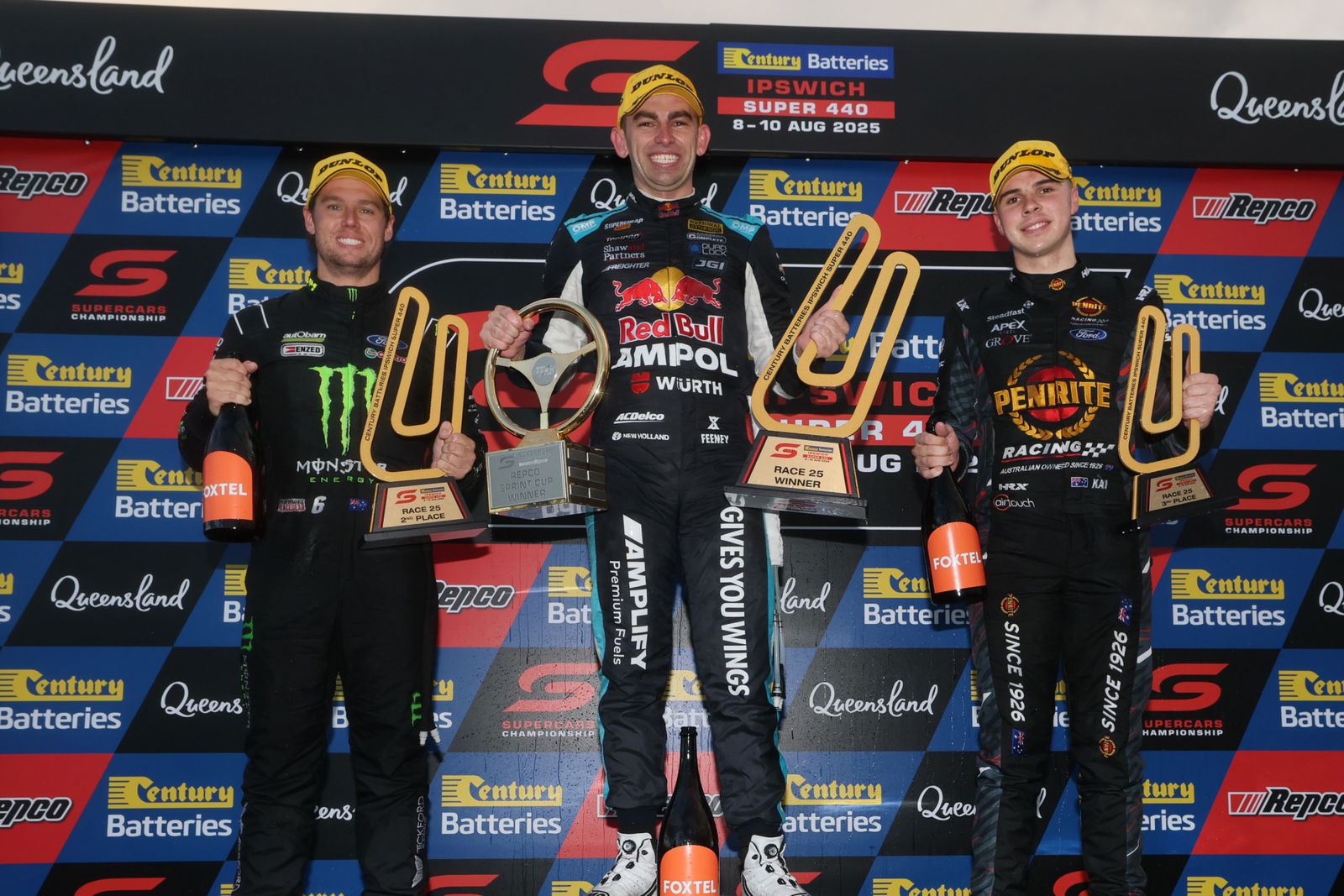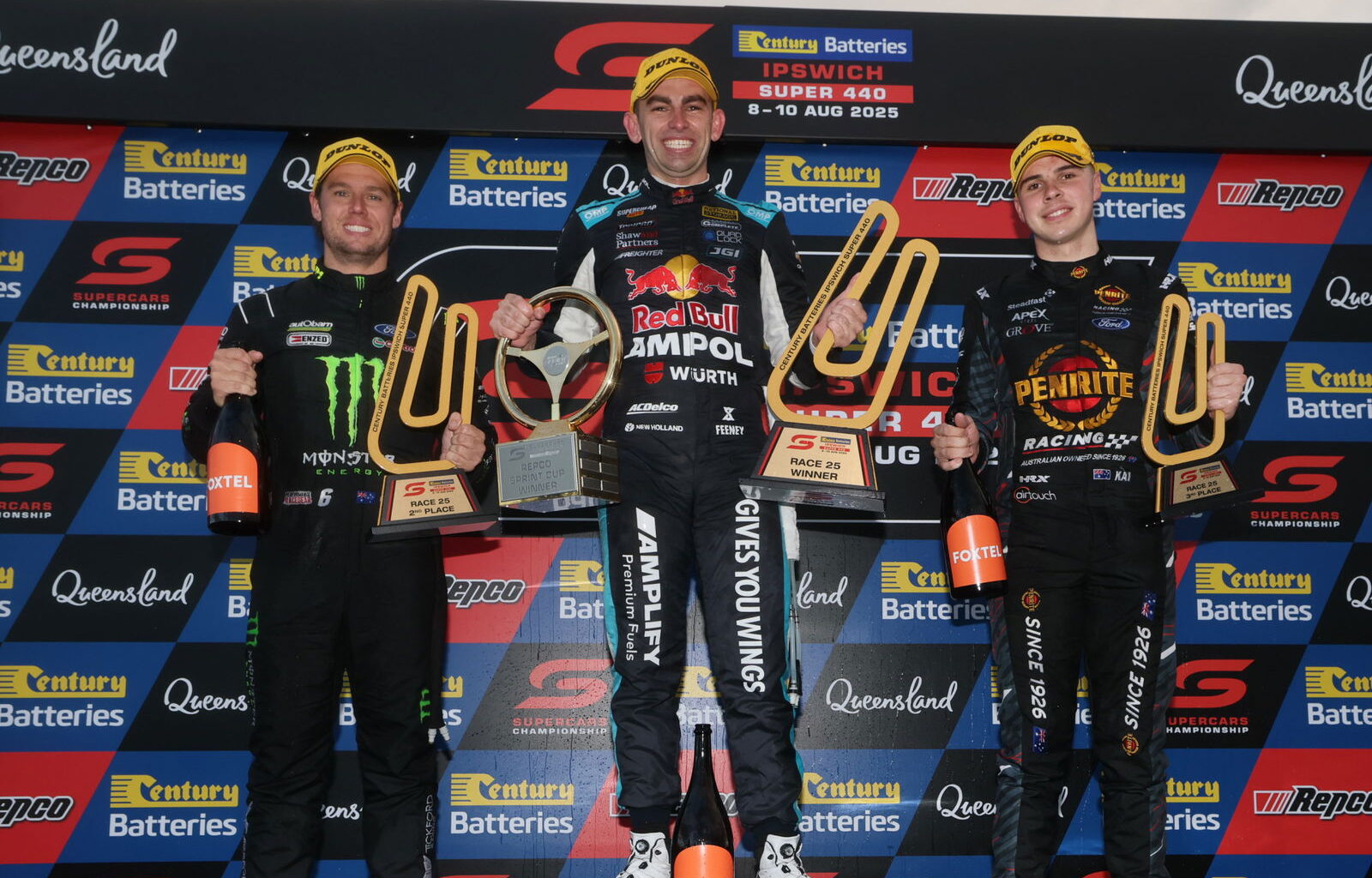
Cameron Waters (left) and Kai Allen (right) were second and third respectively in the third Supercars race at the Ipswich Super440. Image: Mark Horsburgh
A lengthy Safety Car period midway through Sunday’s 200km race turned the contest on its head, as three drivers effectively enjoyed two free pit stops and vaulted to the front of the pack.
Kai Allen, Cam Waters and Andre Heimgartner were the beneficiaries – the trio having qualified deep in the field and then hung out hoping to catch a fortuitously timed Safety Car.
The apparent strategic loophole has been created by the requirement for the field to slow to 80km/h shortly after a Safety Car is called.
The slowdown was introduced at last year’s Sandown 500 under the banner of ‘Full Course Yellow’, aimed at stamping out the practice of drivers speeding back to pit lane under yellow.
Regulations were tweaked this year but are still having a big impact on strategy in races, effectively encouraging teams to stay out as long as possible before pitting.
Unlike when the process was first introduced, there is no guarantee how long Race Control will hold the field at 80km/h before allowing the cars to speed up and catch the Safety Car.
On Sunday, Race Control left the 80km/h hold long enough for the trio to tick off both stops and rejoin ahead of the field.
Waters and Allen ultimately finished the race second and third having proven unable to hold off the rapid Broc Feeney in the final stint.
“Today was all about luck,” lamented Erebus Motorsport team boss Barry Ryan on the Cool Down Lap podcast.
“If you didn’t pit [earlier], you got to pit twice under a full course yellow. We need to fix it because it’s ruining our sport.
“All you’re going to do is wait until your fuel’s empty or there’s a full course yellow, so there’s no strategy. Bathurst is going to be boring as shit, and that’s what everybody’s going to do.
“There’s got to be a better solution. We all want safety, but not at the detriment of the sport. And that is just bad. It’s a bad look going around for three laps at 80km/h. Just crazy.”
Supercars is set to analyse Sunday’s Safety Car intervention and the relevent regulations with Motorsport Australia as part of the regular post-event debrief between the parties later this week.
Grove Racing technical director Grant McPherson also declared the rules must be reviewed ahead of the Endurance Cup, despite his team benefitting on Sunday and in other races earlier this year.
“I think that Supercars really needs to change the rules before the enduros, or we’re all going to run long, and it’s going to be boring,” he told the podcast.
“It doesn’t solve the problem we set out to achieve. It’s not the right solution, and we need to do better and put on a show.”
How Supercars and MA can solve the issue is up for debate, with the latter unlikely to simply wind back the safety-focused 80km/h slowdown rules entirely.
Ryan said requiring cars slow only at the point of the incident during the initial period after the Safety Car is called would be ideal.
Feeney overcomes mid-race madness for wild Ipswich win
“I think that’s ultimately a solution, because you can do it off a point-to-point. Once we get the technology there, that’s easy, but it’s not quite there yet. So it’s hard,” he said.
“You can’t close pit lane because it’s going to make the same thing. You just won’t pit until you run out of fuel. It’s a difficult one but there’s got to be a solution. We’ve got to work on it.”
McPherson suggested that the 80km/h speed is unnecessarily slow.
“The whole point that we’re trying to achieve is to slow the cars down to 95 percent until you get back to the pits, and then the problems go away,” he said.
“We don’t need to slow them to 40 percent. That doesn’t achieve much. If we get the cars under control, which is the whole point of a double-waved yellow, then we’ll be fine.
“That is what we should be trying to achieve.”


